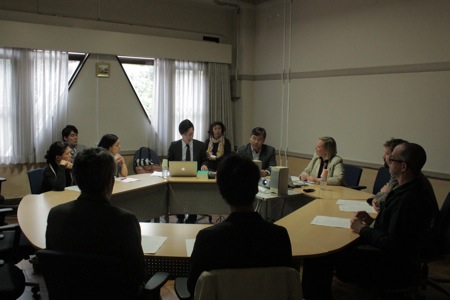[Report] Lecture by Dr. Julia Jansen “The Imagination in Kant"
On April 16th, 2013, UTCP invited Dr. Julia Jansen, University College Cork.
Dr. Jansen’s main research areas are Kant’s theoretical philosophy, Husserlian phenomenology, and aesthetics. She has recently completed a monograph entitled Imagination in Transcendental Philosophy: Kant and Husserl Reconsidered. Her lecture at UTCP was similarly concerned with the concept of “imagination”.
At the beginning of her lecture, “The Imagination in Kant: About the Unprovable Harmony Between Mind and World,” Dr. Jansen emphasized the systematic importance of “imagination” in Kant’s philosophy. She states that Kant thought he had overcome the oppositions between concepts and their relations to the perceptually given, conceptual and non-conceptual content, and so on. On her account, Kant overcame such oppositions by showing, on one hand, that perception is far from being a passive “mirroring” of the world, and, on the other hand, that what is given in perception (intuition) is irreducible to any one sense we make of it.
In the first part of the talk, Dr. Jansen described the character of imagination in Kant as “an ingredient of perception” using his own words. By revisiting some important notions — such as idea, perception, intuition —, Dr. Jansen elucidated the logic of imagination in Kant. In his philosophy, the power of the imagination is at work not only at the level of ideas, but already at the level of perceptions. The claim that the imagination is “a necessary ingredient of perception” is radically new in the period of Kant.

In the second part of her lecture, Dr. Jansen turned to the Critique of Judgment, focusing on the subject of “harmony” between the intelligible and the sensible, or the intellect and sensibility, for, according to Kant, it can only be felt in the experience of beauty. Kant states in the third Critique that the experience of the beautiful is a “free” harmony of the imagination. While the agreement between sensibility and understanding could only be demonstrated as necessary for cognition in the Critique of Pure Reason, Kant shows that it is felt in the experience of the beautiful in the third Critique. From these observations, Dr. Jansen concluded, following Kant, that the human being fits into the world as a subject that “freely” transcends the immediately given and that reflects different possibilities of purpose, concept and meaning by means of the imagination.
The lecture was followed by my comments and discussion with the audience. These were primarily centered on philosophical perspectives on the imagination, with reference to texts by Aristotle, Baudelaire, and Kiyoshi Miki.
Report: Futoshi Hoshino (UTCP)






